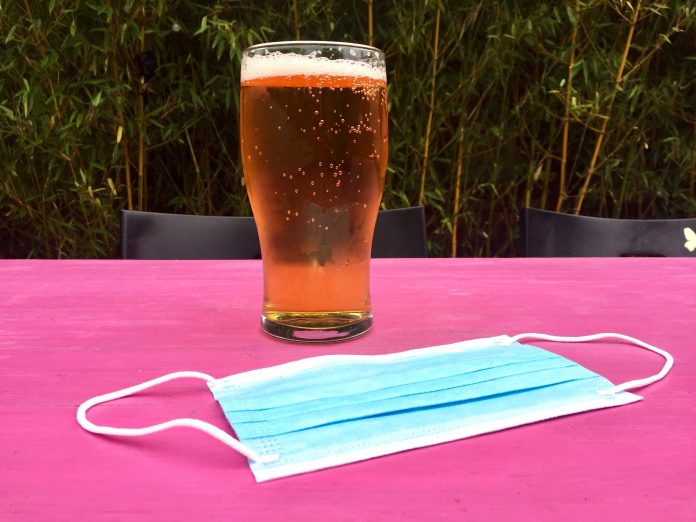A new study has questioned whether pub operators can effectively and consistently prevent COVID-19 transmission risk
Upon reopening licenced premises in Scotland last year venues were required to comply with strict Government safety rules put in place to minimise the risk of COVID-19 transmission.
Those operating to a one-metre physical distancing limit had to put up signs, seat all customers, wear face coverings, and improve ventilation measures.
It was then made a legal requirement for customer details to be collected for contact tracing, and guidance was strengthened around queuing, standing and table service, following an outbreak in August connected to licensed premises in Aberdeen.
COVID-19 transmission
Researchers from the University of Stirling observed risks arising in licensed premises between May and August (2020) to determine whether pubs can effectively and consistently prevent the transmission risk of COVID-19.
The team observed twenty-nine premises for up to two hours while posing as customers and found incidents such as close physical interaction between customers and with staff in all but three venues.
They also found that:
- In all but one of the venues visited in August, customers were witnessed singing loudly or shouting, and only one showed effective staff intervention.
- New venue layouts, signage, queuing systems, noise and toilet management, and hand sanitising stations were infrequently used and only two of the venues routinely administered sanitiser to customers’ on entry.
- Nine businesses did not ask customers to provide contact details to support contact tracing, including one venue that was visited after it was made mandatory by the Scottish Government in August.
- In several venues, staff wore no PPE, wore masks inappropriately, or removed them to talk to other staff or customers.
- Several venues had tables closer together than that without partitions.
- One-way systems were sometimes ignored and pinch points were problematic in nearly all venues, with entrances, corridors, doorways or bar counter areas leading to bottlenecks and people congregating, often unchallenged.
- Fewer than half of venues offered table service only and, in at least one venue observed in July, a continuous queue formed in the one-metre space between tables.
- Fewer than half of venues had a basic system in place to limit the number of customers entering toilets – while most had no measures to ensure physical distancing inside those areas, with no cubicles or sinks condemned.
Professor Niamh Fitzgerald, Director of the University of Stirling’s Institute for Social Marketing and Health, said:
“Our study explored and observed business practices and behaviours of customers and staff in licensed premises in summer 2020 with a view to understanding if and how COVID-19 transmission risks could be managed in settings where alcohol is served. We interviewed business owners and representatives prior to re-opening to understand the challenges being faced. When pubs reopened last July, following the initial UK lockdown, our team visited premises to observe how government measures designed to reduce transmission risks in hospitality settings were working in practice, including any incidents likely to increase those risks.
“Businesses expressed an intention to work within the guidance, but there were commercial and practical challenges to making this a reality. Upon re-opening, substantial efforts to change the layout of bars were observed and appeared to be working well in many premises, but problems were common including staff not wearing personal protective equipment, or with the management of toilets, queues and other ‘pinch points’. We also observed several incidents of greater concern -including customers shouting, embracing or repeatedly interacting closely with several households and staff – which were rarely addressed by staff.
“We concluded that, despite the efforts of bar operators and guidance from government, potentially significant risks of COVID-19 transmission persisted in at least a substantial minority of observed bars, especially when customers were intoxicated. Closures of premises can eliminate these risks, but also cause significant hardship for business owners and staff.
“Our study makes a unique contribution by providing the first evidence, including direct observation data, of how premises operated in practice when allowed to reopen during the COVID-19 pandemic. Overall, our findings suggest grounds for uncertainty about the extent to which new rules can be consistently and effectively implemented in a sector where interaction between tables, households and strangers is the norm, and alcohol is routinely consumed.
“Despite the efforts of licensed premises, and detailed guidance from Government, potentially significant risks of COVID-19 transmission persisted in a substantial minority of observed bars – especially when customers were intoxicated. Blanket closures, curfews or alcohol sales bans are more likely to be deemed necessary to control virus spread, if such risks cannot be acceptably, quickly and cost-effectively reduced through support and/or sanctions for premises operators. Such blanket actions may also have benefits in terms of protecting staff from occupational exposure and reducing pressure on emergency services from alcohol-related injuries or disorder. However, attention also needs to be paid to the impact of closures on businesses, economic activity, employee hardship, and ownership patterns in the sector, as well as any risks posed by diversion of some drinking to the home.”
The study is the first-of-its-kind and was funded by the Scottish Government Chief Scientist Office. It can be read in the Journal of Studies on Alcohol and Drugs.











